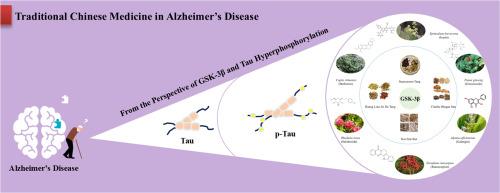Traditional Chinese medicine in Alzheimer's disease: From the perspective of GSK-3β and Tau hyperphosphorylation
Pharmacological Research - Modern Chinese Medicine
Pub Date : 2024-11-06
DOI:10.1016/j.prmcm.2024.100543
引用次数: 0
Abstract
Introduction
Alzheimer's disease (AD) accounts for the majority of dementia cases, characterized by a gradual decline in memory and cognitive functions. Traditional Chinese medicine (TCM) has a long history of treating AD and has proposed a series of causes, pathogenesis and treatment methods, and has extremely rich experience in the treatment of AD. TCM believes that deficiency of the spleen, which is the main organ for the body to absorb nutrients, is one of the important causes of AD. Which coincides with the theory that AD is type 3 diabetes in recent years. Therefore, effectively regulating the common targets of AD and diabetes is a potential strategy for treating spleen deficiency type AD.
Method
By conducting an in-depth search in PubMed and China National Knowledge Infrastructure (CNKI), using the keywords " Traditional Chinese Medicine", "Alzheimer's Disease", "GSK-3β", "Tau Protein" and "Tau Hyperphosphorylation". Ultimately, 92 papers were included for review.
Result
Glycogen synthase kinase 3 beta (GSK-3β) plays a significant role in the pathogenesis of AD, and numerous in vitro and in vivo experiments have demonstrated that Chinese medicine monomers and compounds can inhibit its activity, reducing the hyperphosphorylation of Tau.
Discussion
TCM can affect the activity of GSK-3β through various pathways, thereby reducing the hyperphosphorylation of Tau protein and improving the cognitive function of AD. These studies highlight the potential of TCM in treating AD, but further basic and clinical research is still required to validate their safety and efficacy. It is expected that our review will yield novel insights and a scientific foundation for investigating the underlying mechanisms of AD and developing novel anti-AD therapeutics.

中药在阿尔茨海默病中的应用:从GSK-3β和Tau过度磷酸化的角度看阿尔茨海默病
导言阿尔茨海默病(AD)占痴呆症病例的绝大多数,以记忆力和认知功能逐渐减退为特征。中医治疗阿尔茨海默病历史悠久,提出了一系列病因、病机和治疗方法,在治疗阿尔茨海默病方面有着极为丰富的经验。中医认为,脾主运化,脾虚是AD的重要病因之一。这与近年来AD是3型糖尿病的理论不谋而合。方法以 "中医药"、"阿尔茨海默病"、"GSK-3β"、"Tau蛋白"、"Tau过度磷酸化 "为关键词,在PubMed和中国知网(CNKI)进行深入检索。结果糖原合酶激酶3β(GSK-3β)在AD的发病机制中起着重要作用,大量体外和体内实验证明,中药单体和复方可以抑制其活性,降低Tau的过度磷酸化。这些研究凸显了中药治疗AD的潜力,但仍需进一步的基础和临床研究来验证其安全性和有效性。希望我们的综述能为研究AD的内在机制和开发新型抗AD疗法提供新的见解和科学依据。
本文章由计算机程序翻译,如有差异,请以英文原文为准。
求助全文
约1分钟内获得全文
求助全文

 求助内容:
求助内容: 应助结果提醒方式:
应助结果提醒方式:


